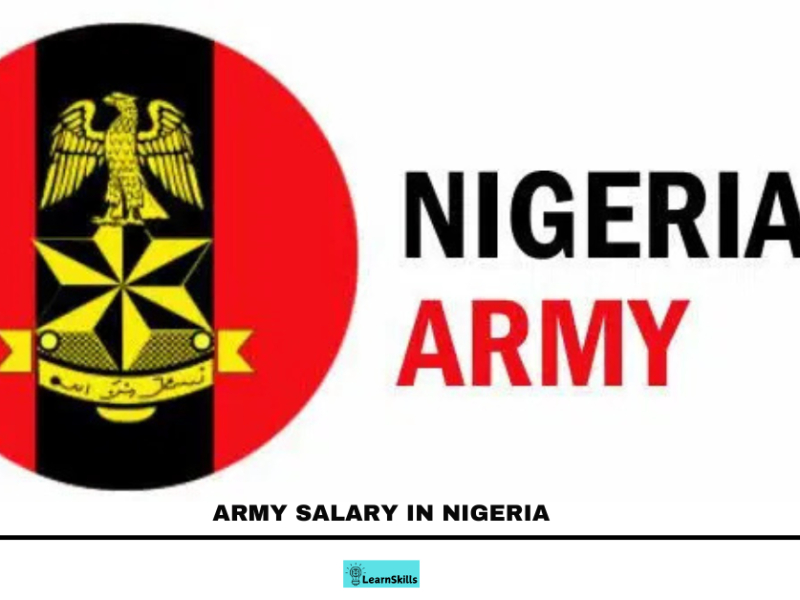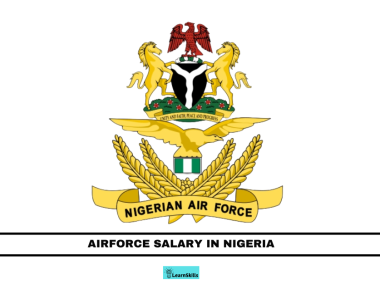If you are curious about the salaries of soldiers in Nigeria, you are not alone. Many people want to know how much members of the Nigerian Army earn and how this affects their lives.
The salary of soldiers varies widely. The monthly pay ranges from ₦49,000 for a Private Soldier to as much as ₦1.5 million for commissioned officers.
Understanding these figures can help you appreciate the commitment and sacrifices made by military personnel. As you explore the salaries based on rank, you’ll gain insight into the structure of the Nigerian Army and the motivations behind joining the service.
Structure of the Nigerian Military
The Nigerian military has several key components that work together to ensure national security.
Nigerian Armed Forces
The Nigerian Armed Forces include the Army, Navy, and Air Force. Together, they serve to protect Nigeria’s sovereignty and maintain peace.
Army: Responsible for ground operations, the Army tackles terrestrial threats and maintains order.
Navy: Safeguarding maritime borders, the Navy defends Nigeria’s waters and engages in naval operations.
Air Force: Focused on aerial defense, the Air Force conducts air missions and surveillance.
These branches have specific training programs and equipment suited to their unique roles. Each force operates under the guidance of the Chief of Defence Staff and other senior leaders.
Army Rank and Hierarchy
The rank structure in the Nigerian Army is well-defined. It helps maintain order and clarity in command.
Commissioned Officers: These include ranks such as Lieutenant, Captain, Major, and General. They typically have higher responsibilities and are involved in strategic planning.
Non-Commissioned Officers (NCOs): Ranks like Sergeant and Warrant Officer fall under this category. They assist in operational management and troop training.
Enlisted Soldiers: This group includes recruits and privates who carry out the essential tasks on the ground.
Below is a small overview of specific ranks:
| Rank | Monthly Salary (Naira) |
|---|---|
| Warrant Officer Class 1 | 90,000 |
| Warrant Officer Class 2 | 80,000 |
| Staff Sergeant | 68,000 |
| Recruit | 10,237 |
This ranking system ensures a clear pathway for career progression while emphasizing leadership and accountability.
Salary and Allowances
In this section, you will find essential details about the monthly salaries, statutory entitlements, and non-monetary benefits for army personnel in Nigeria.
Monthly Salary Overview
The salary for army personnel in Nigeria varies based on rank. Here’s a brief overview of some ranks and their corresponding monthly salaries:
| Rank | Monthly Salary (Naira) |
|---|---|
| Private Soldier | ₦49,000 |
| Lance Corporal | ₦55,000 |
| Corporal | ₦58,000 |
| Sergeant | ₦63,000 |
| Officer (average) | ₦800,000 |
Commissioned officers typically earn more than non-commissioned officers. For example, the average salary for a commissioned officer can reach around ₦800,000 per year, which is about ₦66,667 monthly.
Statutory Entitlements
Besides base salary, army personnel receive statutory entitlements. These may include:
- Housing Allowance: Many soldiers receive housing support, which can be a significant addition to their take-home pay.
- Transport Allowance: This helps cover the costs of traveling for official duties.
- Risk Allowance: Given the nature of military work, personnel may receive extra pay for risks taken during service.
These entitlements ensure that soldiers have financial support, especially when deployed or assigned challenging duties.
Non-monetary Benefits
In addition to salaries and allowances, army personnel enjoy several non-monetary benefits. These may include:
- Healthcare Services: Access to military hospitals and clinics for health care.
- Education Benefits: Opportunities for further education and training.
- Pension Schemes: Soldiers can draw from pension plans that provide financial stability after retirement.
These benefits enhance the well-being of Army members and their families, promoting a better quality of life.
Economic Impact on Military Welfare
Military welfare in Nigeria is influenced significantly by delayed payments and concerns over specific months like January. These problems affect not only soldiers’ morale but also their financial stability.
Delayed Payment Issues
Delayed payments are a critical issue affecting military personnel in Nigeria. Many soldiers face uncertainty when their salaries do not arrive on time. This situation can lead to stress and difficulties in managing personal finances.
Common causes of delays include:
- Corruption: Funds may be misallocated before reaching soldiers.
- Bureaucratic hurdles: Inefficiencies in the payment process can slow disbursement.
Many soldiers struggle to meet their daily needs without prompt payment, impacting their overall well-being.
January Salary Concerns
January is often a challenging month for military personnel in Nigeria. Many soldiers worry about receiving their salaries on time due to past delays.
In some cases, troops have reported:
- Late payments: It may take weeks for January salaries to arrive.
- Financial strain: The delay can cause significant stress as families struggle with holiday expenses.
Timely payments during this month are crucial for maintaining morale and ensuring that soldiers can support their families. Addressing these issues can lead to a more stable and motivated military force.
Security Challenges
You will find that Nigeria faces significant security challenges, particularly related to terrorism, insurgency, banditry, and kidnapping. These issues affect the safety of citizens and the stability of the country.
Counter-Terrorism Efforts
Nigeria’s fight against terrorism is significantly focuses on the militant group Boko Haram. This group has caused immense suffering and instability since its rise in the early 2000s.
The government has deployed military forces to regions like Borno and Yobe to combat Boko Haram’s influence. You will notice that the soldiers in these efforts face harsh conditions and low pay, which can affect morale.
The military collaborates with international partners to enhance its counter-terrorism tactics. Aside from military operations, community engagement and intelligence gathering are crucial for disrupting Boko Haram’s recruitment and operations.
Addressing Insurgency
Insurgency in Nigeria, particularly in the northeast, has led to massive displacement and a humanitarian crisis. The military’s strategy includes offensive operations against insurgents and efforts to rebuild communities.
Security personnel work to establish a presence and support local governments, helping to restore order.
You may see significant military operations designed to clear areas held by insurgents. These operations often require updated training and resources. With increasing calls for a salary increase for soldiers, their effectiveness can be linked to better pay and support.
Combating Banditry and Kidnapping
Banditry and kidnapping have surged in various regions, especially in the northwest. Criminal groups have targeted individuals for ransom, creating fear and mistrust within communities. The military, alongside police forces, launches operations to tackle these groups.
Tackling banditry requires both military presence and community relations. Security forces engage with local leaders to gather information about criminal activities.
Improved salaries and conditions for soldiers are critical for maintaining order in these challenging situations.
Leadership and Command
The leadership structure of the Nigerian Army is crucial for effective command and control. Understanding the hierarchy and official statements can help you grasp how military decisions are made.
Current Military Hierarchy
The Nigerian Army operates under a well-defined hierarchy. At the top is the Chief of Army Staff, Faruk Yahaya, oversees all operations. Just below him are the Major Generals, each responsible for different divisions and areas.
The positions include:
- Major Generals: Command divisions.
- Brigadier Generals: Lead brigades.
- Colonels: Command battalions.
- Lieutenant Colonels: Oversee companies.
Below these ranks are non-commissioned officers, such as Sergeants and Corporals, who manage smaller units. This structured command allows for clear lines of authority, ensuring swift decision-making, which is vital in military operations.
Public Statements from Officials
Public statements from military leaders and government officials shape public understanding of military actions. Muhammadu Buhari, the former President, emphasized support for the army in combating insecurity.
The Army spokesperson, Onyema Nwachukwu, often provides updates on operations. He stresses transparency and accountability in the armed forces.
Statements focus on:
- Enhancements in safety measures.
- Progress in ongoing operations.
- Commitment to fighting terrorism.
These communications help inform the public about the military’s role in national security and its leadership’s objectives. The insight they provide fosters trust between the army and the citizens.










